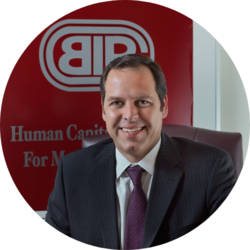
Improve Retention and Executive Talent Quality with this Advanced Hiring Process
According to Peter Cappelli, a professor of management at the Wharton School, “Businesses have never done as much hiring as they do today. And they’ve never done a worse job of it.” You can change that.
It’s A Buyer’s Market
COVID-19 has taken an alarming toll on the employment rate in most countries. However, as far as C-suite executives and top-level talent go, the job market is still a buyer’s market. Companies compete fiercely to hire the best-of-the-best, and ideal candidates can often work wherever they choose. Businesses are therefore tasked with becoming employers of choice in order to attract and retain highly qualified individuals.
You will read countless articles extolling the importance of creating a desirable company culture and workplace experience, but most of them don’t mention that an integral part of doing that comes down to how you handle the hiring process.
Most traditional hiring methods are outdated and frankly unreliable at pinpointing the right person for the job and inspiring company loyalty. Following is an advanced hiring process, which will help your company find and keep its future leaders.
Go To The Source
It’s better to drop your hook where you know the big fish swim than it is to cast a net that gathers every minnow in the lake. The conventional ‘net’ approach to recruitment (posting a job description and waiting to see who applies) is roughly equivalent to putting a ‘help wanted’ sign in your window. You have little control over who responds, and you’ll spend unnecessary time sifting through resumes. Go to your talent instead of making them come to you. Direct sourcing narrows down your search results; after all, you don’t need 100 applicants—you need the right one.
Ask Skill-Based Questions
This advice may sound like a no-brainer, but typical interview questions are usually irrelevant when you’re trying to evaluate a person’s real abilities. For instance, when you ask someone about their strengths and weaknesses, they’ll invariably tell you what they think you want to hear. Even the ubiquitous “tell me about a time when you [fill in the blank]” question many times tests their storytelling abilities (because many can’t remember a good example), not their actual abilities. Instead, identify the competencies you seek and consider questions like the following:
- How would you handle [describe a situation]?
- How would you solve [describe a problem]?
- How would you address [describe a complaint]?
- How do you think we should approach [describe your goals or problems]?
- If you were in charge of [describe a project], how would you proceed?
- What techniques do you find most useful in developing your subordinates?
- What is the greatest limitation you have found about your management style?
- What are your short-term and long-term goals for this position?
Give Your Candidates Time To Prepare For High-Level Questions
If you ask high-level questions like some of the above, however, don’t fire them at your candidates out of nowhere. Answers to these kinds of questions require analysis and preparation, which are skills that you want to gauge anyway. Send them a small list of questions before the interview. Their preparation will be another way for you to ascertain their commitment, creativity, and thought processes. However, don’t send them all the questions, only a few high-level ones, as you also want to discover how your candidates think under time-sensitive situations and stress.
Ask Prospects To Prepare Questions
Tell your candidates that you expect them to direct a portion of the interview themselves by asking questions about the position and the company. Former Fortune 500 HR Senior Vice President Liz Ryan says, “The traditional interviewing protocol in which the interviewer asks questions and the candidate answers them is nonsense. It has never been effective. It is power-based, which means it is fear-based. You will always learn more about a person through their questions than their answers to your questions.”
Again, it’s important to give your applicants a chance to prepare their questions before the interview. The age-old “thank you for coming in; do you have any questions for us?” method feels rushed and doesn’t give the interviewee a chance to delve deep.
Let Your Applicants’Walk the Walk’
As popular as they are, personality and behavior assessments are at times not indispensable in the hiring process although they do have their purpose. You should get a solid feeling and evidence about a prospect’s personality and behaviors using the methods described above. Instead, give your candidates a chance to strut their stuff. Get their input on a project. Have them do a demonstration. Let them shadow a prospective colleague at work or sit in on a meeting and invite their participation. Conduct a hands-on test of a relevant skill. Potential employees who are excited about the career opportunity will welcome the chance to show you what they can do, and you will see firsthand the level at which they operate.
Make Sure You Check References
If you can (and are allowed to), go beyond the references you are provided by the candidate. Do your homework and research the direct supervisors, peers and subordinates of the targeted candidate you seek to hire. Ask them all the difficult questions. Communicate the key challenges and ask if they think the candidate is a good fit and why. If you talk to a previous boss, ask them what they liked best and also what gift they would give their previous subordinate. Focus on the competencies you seek and ask specific questions. If you have concerns, communicate what they are and confirm if they are legitimate. Be persistent.
Showcase Your Culture From The Start
You don’t make your first impression on your employees on their first day of work; you make it with the very first contact. In fact, research indicates that employees who have a positive hiring experience are 69% more likely to stay at the same company for at least three years. If you make your hiring process pleasant, inspiring, energizing, and unique, high-quality executives will realize that working for you will be the same way. They’ll want to come and be happy to stay.

By Fernando Ortiz-Barbachano
President and CEO of Barbachano International (BIP),
The Human Capital Solutions leader in Mexico, Latin America, and the USA, offering high-impact executive search, executive coaching, and outplacement.
About Barbachano International
Barbachano International (BIP) is the premier executive search and leadership advisory firm in the Americas (USA, Mexico, Latin America, & Canada) with a focus on diversity and multicultural target markets. Outplacement and Executive Coaching services are provided by our sister allied company Challenger Gray & Christmas. Since 1992, BIP and its affiliates have impacted the profitability of over 50% of Fortune 500 Companies. BIP has been recognized by Forbes as Americas’ Best Executive Search Firms and currently ranks #27 and #3 on the West Coast. Headquartered in San Diego, California with satellite offices in Florida and Mexico. As member-owners of NPAworldwide Recruitment Network, we are supported by partner offices in over 50 countries.



